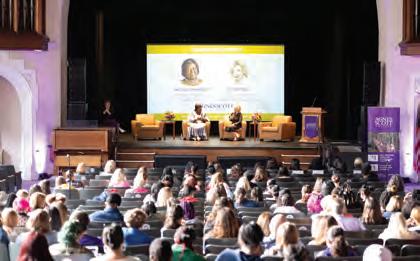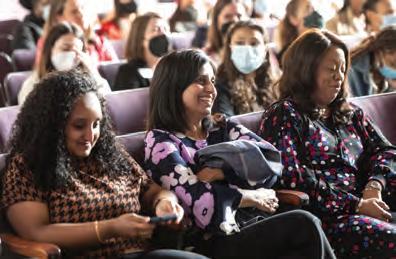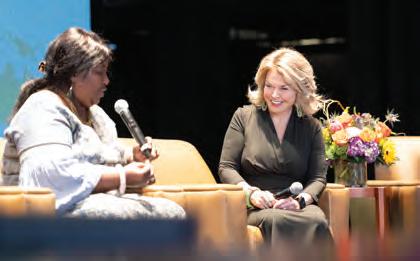
1 minute read
OCTOBER’S CONFERENCE PROMPTED THOUGHTFUL QUESTIONS AND DISCUSSIONS ABOUT WHAT INCLUSIVE LEADERSHIP LOOKS

Like
infrastructure, very progressive politics, very progressive ways of communicating,” says Graml.
Paige Alexander, CEO of The Carter Center, and Vanessa Ibarra, from the mayor of Atlanta’s Office of International Affairs were also among the influential speakers at the conference.

Alexander, whose illustrious career spans over 20 years, outlined how leadership in the public, non-profit sector can exact change in domestic and international spheres.
Ibarra’s leadership has helped Atlanta fortify its relationships with international cities and attract international events such as the Smart City Expo Atlanta and the Atlanta Christkindl Market. Ibarra also supported the establishment of the Atlanta Global Studies Center, a higher education consortium of universities to build global competence and awareness.
The conference also featured panel discussions with prominent business and community leaders.
Michelle Gadsden Williams (BlackRock), Sue Lam (CocaCola) and Bentina Chisolm Terry (Georgia Power) discussed how organizations should foster inclusivity in professional settings. The second panel discussion centered on the ways to create inclusivity from the ground up and featured Soumaya Khalife of the Islamic Speakers Bureau of Atlanta, founder of Transformation Journeys Worldwide Gabrielle Claiborne and Dr. Gulshan Harjee of the Clarkston Community Health Center.
“I think in line with the college’s mission to engage social and intellectual challenges, and reflective of our students, who are first-generation, students of color, Pell Grant-eligible, the first thing we really want to communicate is that a liberal arts education provides critical thinking and communication skills essential for any leadership role. It can be onthe-ground grassroots leadership. It can be the CEO. It can be leadership spearheading change against establishment powers. It can be people joining the corporate or political establishment to effect change there,” says Graml.
The conference concluded with a fireside chat between President Leocadia I. Zak and Ed Bastian, CEO of Delta Air Lines, in which they discussed inclusive leadership’s ability to foster innovation and shared enlightening stories of the impact of strategic alliances between industry and education.
“[Bastian] not only added a global corporate perspective,” says Graml, “but as a male speaker, he gave a nod to the fact that global women’s empowerment cannot just be the work of women from minority backgrounds. It takes allies and a critical self-reflection of male leaders in this process as well.”
October’s conference prompted thoughtful questions and discussions about what inclusive leadership looks like in industry and the importance of grassroots initiatives in fueling change. The theme of this year’s conference tied seamlessly with Agnes Scott College’s mission of global, inclusive learning.
“I think for our students to see this large group of women leaders at all these positions in society, almost all of them women of color, having a powerful way of talking about their experience professionally and personally was really impactful,” says Graml.










